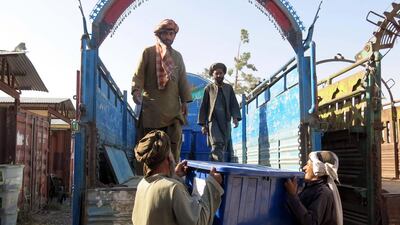KABUL // One chapter in Afghanistan’s difficult political and military transition will move a step closer to ending on Saturday when the second round of the presidential election is held.
But even after the long, drawn out race reaches a conclusion a new set of problems seems certain to arise for the winner and the country as a whole.
Analysts believe the Taliban’s continued insurgency, the impending withdrawal of foreign troops and backroom deals made with powerful supporters during the campaign will immediately put serious pressure on the next president.
Only two men are left standing for office and both have served in high-level government positions in the past. Abdullah Abdullah is a former foreign minister and the current favourite. Although he won the first round of the election, he failed to achieve the more than 50 per cent of votes needed to triumph outright. Of mixed parentage, he is generally regarded as being closest to the ethnic Tajik community, the country's largest minority group.
His opponent is Ashraf Ghani, part of the majority Pashtun ethnic group, a ex-cabinet member and former World Bank technocrat who finished runner-up on April 5.
The rivalry between the two has become increasingly fractious in recent weeks but much of the hostility still lies under the surface. It has also spread to others who may stand in the way of their victory.
Naeem Ayubzada is director of the Transparent Election Foundation of Afghanistan (Tefa), an umbrella organisation of dozens of civil society groups in the country.
He told The National he and his staff had received threats before the first round, when eight candidates were running for the presidency. These threats were allegedly made not only by the Taliban but by associates of Mr Abdullah and Mr Ghani as well.
Reluctant to go into details, he said, “It is challenging for us in specific provinces to work independently and to work freely, without any fear.”
The first round of the election was generally viewed as a success, with turnout at about 60 per cent despite bad weather and the insecurity that plagues much of the country.
Tefa had 7,500 observers working on polling day and Mr Ayubzada said the vote went well compared to previous elections. But he added that stuffing of ballot boxes was common and claimed police chiefs in several provinces had been working for the three leading candidates: Mr Abdullah, Mr Ghani and Zalmai Rassoul, who has since chosen to back Mr Abdullah in the second round.
Asked if the candidates are aware of what happens on their behalf, he said, “Most of the time they know. They have to, they are the leaders.”
Mr Abdullah and Mr Ghani have accused each other’s supporters of committing widespread fraud in the first round and the mutual ill-feeling has only risen in the build-up to Saturday. The Independent Election Commission recently warned the candidates not to encourage ethnic and religious tension, blaming both sides of stirring up discrimination.
Before the election commission went public with its concerns, Mr Ayubzada said he had similar worries and had personally raised this issue with Mr Abdullah and Mr Ghani, who both pledged not to use such tactics.
A key feature of the run-off campaign was the way the two candidates tried to co-opt their rivals from the first round. Mr Abdullah has received the backing of three of the most prominent figures who ran then, including Mr Rassoul. However, several of their supporters have broken ranks to join Mr Ghani.
Mr Ayubzada is concerned that both men have been offering positions and influence within any future government in exchange for electoral favours.
“If the breakdown [of power] is into a hundred pieces and if you give one small piece to everybody then it will be very challenging for the president to have a transparent leadership, to transparently manage the government and be loyal to the commitments he made to the people.”
Whoever wins will be faced with tests soon after taking office, inluding a dire security situation. Mr Abdullah and Mr Ghani have promised to sign a security agreement with Washington that will keep American troops in the country beyond this year. But under terms recently announced by the US president Barack Obama, the size of that residual force will be only 9,800 soldiers – dropping to a few hundred after 2016.
Last Friday, Mr Abdullah survived a suicide attack targeting his convoy in Kabul – an incident the Afghan government blamed on an unnamed foreign intelligence service and the Pakistani militant group Lashkar-e-Taiba.
Afghanistan has one of the most corrupt governments in the world, according to Transparency International, and economic growth has begun to slow down drastically as the troop withdrawal gathers pace. The Taliban have also vowed to fight on until what they regard as an Islamic government is established.
Parwiz Kawa, the editor-in-chief of the daily newspaper Hasht-e Sobh, agreed the candidates might have problems fulfilling the backroom promises they have made. He said it was vital the ministers responsible for Afghanistan's security forces remained in their posts and were not changed as part of deals struck during the campaign.
Even then, he predicted the new administration would face a tough fight for survival.
“The international community will be leaving the country and once the international community leaves, resources also leave,” said Mr Kawa. “We do not have that much capacity in the government to finance all the public expenses that we have. Forget about development – they are not able to run the government.”
foreign.desk@thenational.ae

